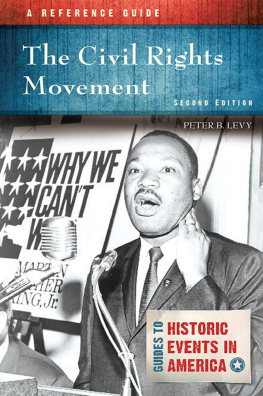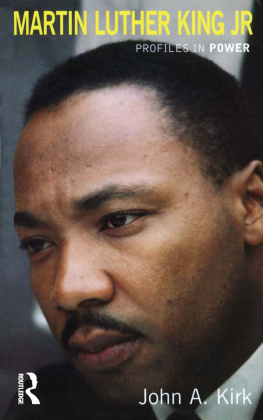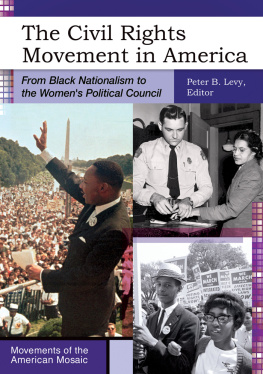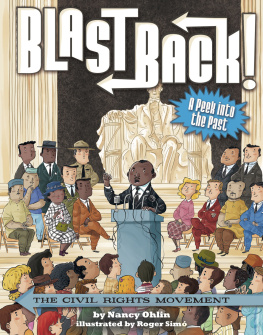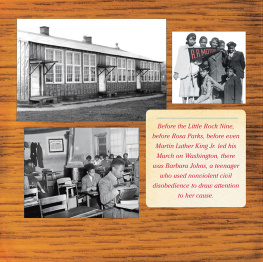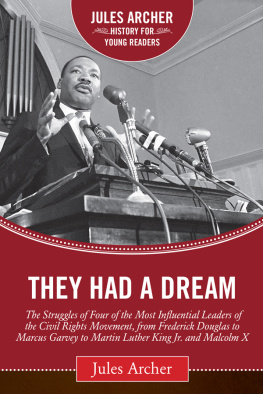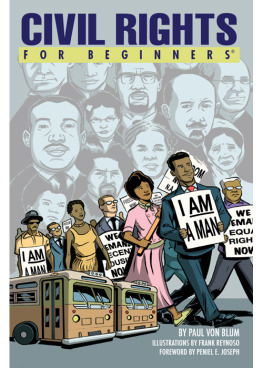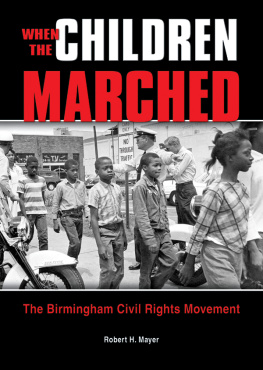THE CIVIL RIGHTS MOVEMENT
Recent Titles in the Guides to Historical Events in America
Randall M. Miller, Series Editor
McCarthyism and the Red Scare: A Reference Guide
William T. Walker
The Underground Railroad: A Reference Guide
Kerry W alters
Lincoln, the Rise of the Republicans, and the Coming of the Civil
War: A Reference Guide
Kerry W alters
America in the Cold War: A Reference Guide
William T. Walker
Andrew Jackson and the Rise of the Democrats: A Reference Guide
Mark R. Cheathem
The Progressive Era: A Reference Guide
Francis J. Sicius
Reconstruction: A Reference Guide
Paul E. Teed and Melissa Ladd Teed
The War for American Independence: A Reference Guide
Mark Edward Lender
The Constitutional Convention of 1787: A Reference Guide
Stuart Leibiger
THE CIVIL RIGHTS MOVEMENT
A Reference Guide
Second Edition
Peter B. Levy
Guides to Historic Events in America Randall M. Miller, Series Editor
Copyright 2019 by ABC-CLIO, LLC
All rights reserved. No part of this publication may be reproduced, stored in a retrieval system, or transmitted, in any form or by any means, electronic, mechanical, photocopying, recording, or otherwise, except for the inclusion of brief quotations in a review, without prior permission in writing from the publisher.
Every reasonable effort has been made to trace the owners of copyright materials in this book, but in some instances this has proven impossible. The editors and publishers will be glad to receive information leading to more complete acknowledgments in subsequent printings of the book and in the meantime extend their apologies for any omissions.
Library of Congress Cataloging-in-Publication Data
Names: Levy, Peter B., author.
Title: The civil rights movement : a reference guide / Peter B. Levy.
Other titles: Civil rights movement in America.
Description: Second edition. | Santa Barbara, California: ABC-CLIO, LLC, [2019] | Series: Guides to historic events in America | Includes bibliographical references and index. |
Identifiers: LCCN 2019020667 (print) | LCCN 2019020746 (ebook) | ISBN 9781440863011 (ebook) | ISBN 9781440863004 (print : alk. paper)
Subjects: LCSH: Civil rights movementsUnited StatesHistoryEncyclopedias. | African AmericansCivil rightsHistoryEncyclopedias. | Civil rights workersUnited StatesBiographyEncyclopedias. | United StatesRace relationsEncyclopedias.
Classification: LCC E185.61 (ebook) | LCC E185.61 .C6148 2019 (print) | DDC 323.1196/073dc23
LC record available at https://lccn.loc.gov/2019020667
ISBN: 978-1-4408-6300-4 (print)
978-1-4408-6301-1 (ebook)
23 22 21 20 19 1 2 3 4 5
This book is also available as an eBook.
ABC-CLIO
An Imprint of ABC-CLIO,LLC
ABC-CLIO, LLC
147 Castilian Drive
Santa Barbara, California 93117
www.abc-clio.com
This book is printed on acid-free paper 
Manufactured in the United States of America
Contents
Perhaps no people have been more difficult to comprehend than the Americans. As J. Hector St. Jean de Crvecoeur asked during the American Revolution, countless others have echoed ever after "What then is this American, this new man?" What, indeed? Americans then and after have been, and remain, a people in the process of becoming. They have been, and are, a people in motion, whether coming from a distant shore, crossing the mighty Mississippi, or packing off to the suburbs, and all the while following the promise of an American dream of realizing life, liberty, and happiness. The directions of such movement have changed, and sometimes the trajectory has taken a downward arc in terms of civil war and economic depression, but always the process has continued.
Making sense of that American experience demands attention to critical momentseventsthat reflected and affected American ideas and identities. Although Americans have constructed an almost-linear narrative of progress from the days of George Washington to today in relating their common history, they also have marked that history by recognizing particular events as pivotal in explaining who and why they believed and acted as they did at particular times and over time. Such events have forced Americans to consider closely their true interests. They also have challenged their commitment to professed beliefs of freedom and liberty, equality and opportunity, tolerance and generosity. Whether fighting for independence or empire, drafting and implementing a frame of government, reconstructing a nation divided by civil war, struggling for basic rights and the franchise, creating a mass-mediated culture, standing up for capitalism and democracy and against communism, to name several critical developments, Americans have understood that historic events are more than just moments. They are processes of change made clear through particular events but not bound to a single moment or instance. Such thinking about the character and consequence of American history informs this new series of Guides to Historic Events in America .
Drawing on the latest and best literature, and bringing together narrative overviews and critical chapters of important historic events, the books in the series function as both reference guides and informed analyses to critical events that have shaped American life, culture, society, economy, and politics, and fixed Americas place in the world. The books do not promise a comprehensive reading and rendering of American history. Such is not yet, if ever, possible for any single work or series. Nor do they chart a single interpretive line, though they share common concerns and methods of inquiry. Each book stands alone, resting on the expertise of the author and the strength of the evidence. At the same time, taken together the books in this new series will provide a dynamic portrait of that ongoing work in progress, America itself.
Each book follows a common format, with a chronology, historical overview, topical chapters on aspects of the historical event under examination, a set of biographies of key figures, selected essential primary documents, and an annotated bibliography. As such, each book holds many uses for students, teachers, and the general public wanting and needing to know the principal issues and the pertinent arguments and evidence on significant events in American history. The combination of historical description and analysis, biographies, and primary documents also moves readers to approach each critical event from multiple perspectives and with a critical eye. Each book in its structure and content invites students and teachers, in and out of the classroom, to consider and debate the character and consequence(s) of the historic event in question. Such debate invariably will bring readers back to that most critical and never-ending question of what was/is the American and what does, and must, America mean.
Randall M. Miller
Saint Josephs University, Philadelphia
The twentieth century witnessed numerous historic events, from the Russian and Chinese revolutions to World War I and World War II. These wars and revolutions, along with the space program, the collapse of communism, and the Holocaust, have had a dramatic impact on the historical terrain. Likewise, the modern civil rights movement had been one of the century's historic events. Emerging in the 1950s and reaching a peak in the 1960s, the civil rights movement prompted the federal government to enact sweeping reforms that toppled Jim Crow; virtually eliminated public assertions of white supremacy, a mainstay of the American cultural and intellectual tradition; and boosted black pride. In addition to altering race relations in the United States, especially in the South, the civil rights movement sparked other liberation struggles in America and abroad, from the women's liberation movement to the drive to overcome apartheid in South Africa. Indeed, even though the civil rights movement did not achieve all of its goals, nearly a half-century after Rosa Parks refused to give up her seat on a segregated bus in Montgomery, Alabama, it continues to have an impact on the course of history, serving as an agent and as a model of the quest for human rights.

